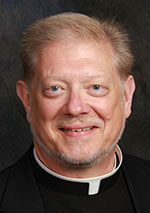That All May Be One / Fr. Rick Ginther
Catholics, other faiths seek and live truths to guide behavior
 “The Catholic Church rejects nothing that is true and holy in [other] religions. She regards with sincere reverence those ways of conduct and of life, those precepts and teachings which, though differing in many aspects from the ones she holds and sets forth, nonetheless often reflect a ray of that Truth which enlightens all men” (from the Second Vatican Council’s document, “Nostra Aetate,” #2).
“The Catholic Church rejects nothing that is true and holy in [other] religions. She regards with sincere reverence those ways of conduct and of life, those precepts and teachings which, though differing in many aspects from the ones she holds and sets forth, nonetheless often reflect a ray of that Truth which enlightens all men” (from the Second Vatican Council’s document, “Nostra Aetate,” #2).
As I encounter people of other religions, I find we have much in common. We seek and live truths that guide our behavior.
Last week, someone pointed out to me that the Golden Rule—“Do unto others as you would have them do to you”—is found in all major world religions, often in ancient sources.
This piqued my curiosity. Here is what I have found.
Jesus spoke this truth of the Golden Rule to his disciples in the Gospel of Matthew (Mt 7:12). We Christians tend to think it originated with our Lord.
However, this command for “reciprocity” was known in the Wisdom literature of the Old Testament—Tobit 4:15 and Sirach 31:15.
Jesus’ command “to love you neighbor as yourself” is like the Golden Rule. Its Hebrew source is Leviticus 19:18.
In keeping with the urging of “Nostra Aetate,” let us explore the parallel equivalents of the Golden Rule.
From an ancient Egyptian source papyrus: “That which you hate to be done to you, do not do to another.”
From an ancient epic of India: “One should never do something to others that one would regard as an injury to one’s own self.”
From the Book of Virtue of the Tamil tradition: “Do not do to others what you know has hurt yourself,” and “Why does one hurt others knowing what it is to be hurt?”
From ancient Greece (Plato): “May I be of a sound mind and do to others as I would that they should do to me.”
From the Babylonian Talmud (Judaism): “What is hateful to you, do not do to your fellow: this is the whole Torah; the rest is explanation; go and learn.”
From the prophet Muhammad’s “Hadith,” a collection of what the prophet is believed to have said and done: “A Bedouin came to the prophet, grabbed the stirrup of his camel and said, ‘O the messenger of God! Teach me something to go to heaven with it.’ The prophet said: ‘As you would have people do to you, do to them’ and what you dislike to be done to you, don’t do to them. Now let the stirrup go.’ (This maxim is enough for you; go and act in accordance with it!]”
From the Baha’i faith: “And if thine eyes be turned toward justice, choose thou for thy neighbor that which thou choosest for thyself.”
From Hinduism: “If the Dharma can be said in a few words, then it is—that which is unfavorable to us, do not do that to others.”
From Buddhism: “Hurt not others in ways that you yourself would find hurtful.”
From Jainism: “Just as sorrow or pain is not desirable to you, so it is to all which breathe, exist, live or have any essence of life.”
From Sikhism: “Precious like jewels are the minds of all. To hurt them is not at all good. If though desirest thy Beloved, then hurt thou not anyone’s heart.”
I could go on with quotes from Confucianism, Taoism or Zoroastrianism. But the point is eminently made.
We do share truth with other religions. Their adherents are as challenged as we to live these truths.
Perhaps, as we approach Thanksgiving and Christmas, these sayings provide us more reason to be kind, generous and loving.
(Father Rick Ginther is director of the archdiocesan Office of Ecumenism and Interreligious Affairs. He is also the pastor of Our Lady of Lourdes Parish in Indianapolis.) †
 “The Catholic Church rejects nothing that is true and holy in [other] religions. She regards with sincere reverence those ways of conduct and of life, those precepts and teachings which, though differing in many aspects from the ones she holds and sets forth, nonetheless often reflect a ray of that Truth which enlightens all men” (from the Second Vatican Council’s document, “Nostra Aetate,” #2).
“The Catholic Church rejects nothing that is true and holy in [other] religions. She regards with sincere reverence those ways of conduct and of life, those precepts and teachings which, though differing in many aspects from the ones she holds and sets forth, nonetheless often reflect a ray of that Truth which enlightens all men” (from the Second Vatican Council’s document, “Nostra Aetate,” #2).